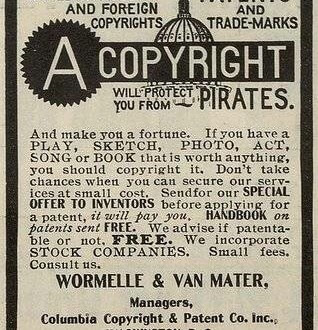Ricochet is the best place on the internet to discuss the issues of the day, either through commenting on posts or writing your own for our active and dynamic community in a fully moderated environment. In addition, the Ricochet Audio Network offers over 50 original podcasts with new episodes released every day.
 What’s the Proper Conservative Position on Copyright Duration?
What’s the Proper Conservative Position on Copyright Duration?
 Who should conservatives side with in the battle between those who favor extended governmental protection for copyrights as the promotion of private property vs. those who believe that too much protection hurts consumers? Steven Tapp makes a strong argument in National Review that we should favor the former:
Who should conservatives side with in the battle between those who favor extended governmental protection for copyrights as the promotion of private property vs. those who believe that too much protection hurts consumers? Steven Tapp makes a strong argument in National Review that we should favor the former:
From the words and deeds of the Founders to the rulings of the Rehnquist and Roberts Courts, it is clear that the American free-market system is designed to promote private-property rights, including copyright, as the best engine of economic growth and freedom of expression.The public domain has its place as a venerable and valuable aspect of copyright law and reasonable people can and do disagree about the best way to write copyright law. But proposals to slash the duration of copyright to expand “public property” simply aren’t conservative.
Tapp is writing in response to a recent proposal by Derek Khanna, self-professed spokesman for conservatives on copyright issues:
In recent decades, a number of special interests called the “copyright lobby” have ensured their copyrighted works would never enter the public domain by keeping their copyright terms continuously elongated. The public-policy goals of this copyright-inflation movement have been in clear violation of the Constitution’s text and its original public meaning.
The recapture of works that would be in the public domain represents one of the biggest thefts of public property in history — and has had significant economic effects upon our culture, personal liberty, and economy.
Where do Ricochet members weigh in? Read both pieces and share your opinions in the comments.
Published in General





You really don’t understand copyright, do you? It is not a government guarantee of income. A copyright holder is not guaranteed any income. A copyright holder is merely guaranteed income for each sale of a work for a limited time. The issue of this discussion is how long a period is appropriate.
It must be long enough to encourage production of works. It must be short enough to so works continue to be available after economically viability of publication has passed.
To quote Ben Johnson, “No man, but an idiot, ever wrote, except for money.” I write for money. Without copyright, the money for producing a work goes to the guy that owns the biggest printing press, not the creator of a work. This happened frequently in the 1600s and 1700s.
Problems arise when copyright terms as so long material becomes unavailable due to copyright. That is the issue.
Seawriter.
I’m no expert but I think you have it wrong too. We get Copyrights on intellectual property, because it is property, and in America, property rights are fundamental to our basic rights. Income is just a benefit.
If you say so. But why is “intellectual property” is property? It is property because the law – an artificial construct – defines it as property. It is a relatively new concept — really no more than 300 or so years old. In large part it has arisen as a result of the printing press in the 1400s. Cicero, despite publishing his works, did not collect royalties on them.
No, intellectual property exists only to encourage the creation of written works, music, and images. Income is not a “benefit” – it is the reason for the concept. Unless creators get remuneration for their efforts, much less is produced.
The concept of intellectual property is less for the benefit of individuals than it is for the benefit of society. The Constitution states:
The issue is what time limit.
Seawriter
Were this the case, then why would there be any limit on copy rights? If you own real estate, that ownership does not expire after 99 years. A lease may, but ownership does not.
As Seawriter and others have pointed out, the concept, and specifically the government-regulated concept is relatively new. Intellectual property laws allowed the creation of several new occupations/industries: author, songwriter, inventor, etc. Before that, those involved in these occupations had to have a day job or a patron. (Okay, many still need that day job: writing professor, performer, engineer, etc.) The purpose of the law is to encourage more artistic (including the mechanic arts) creation by allowing people to reap rewards. We would not have several artistic industries to the level we do without copyright laws.
So, the question returns, what is the copyright period that encourages creation, but also encourages free circulation of ideas?